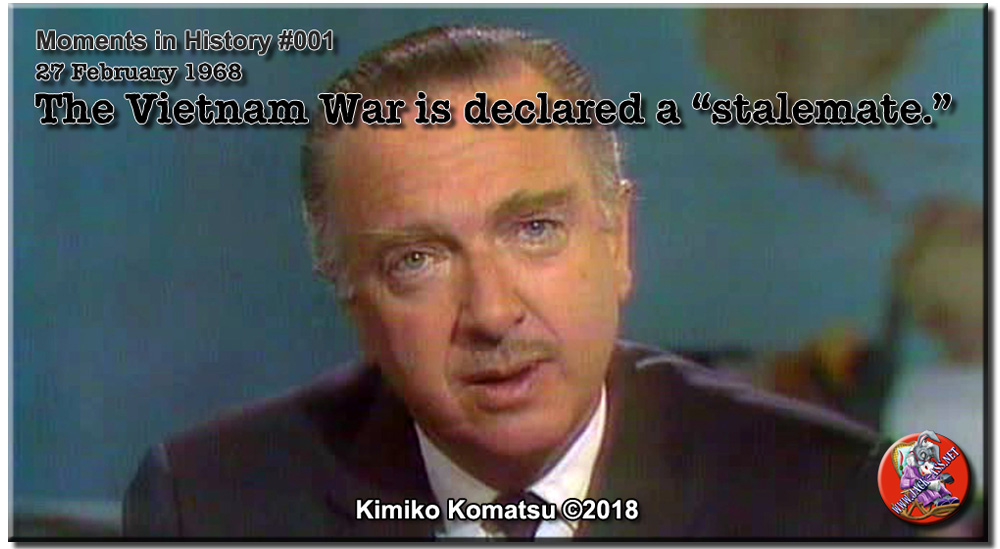

On the evening of 27 February 1968[1], on the CBS Evening News, Walter Leland Cronkite Jr., known to millions as “the most trusted man in America,”[2] made the statement:
“To say that we are closer to victory today is to believe, in the face of the evidence, the optimists who have been wrong in the past. To suggest we are on the edge of defeat is to yield to unreasonable pessimism. To say that we are mired in stalemate seems the only realistic, yet unsatisfactory, conclusion. On the off chance that military and political analysts are right, in the next few months we must test the enemy's intentions, in case this is indeed his last big gasp before negotiations . But it is increasingly clear to this reporter that the only rational way out then will be to negotiate, not as victors, but as an honorable people who lived up to their pledge to defend democracy, and did the best they could. This is Walter Cronkite; good night.” [3]
The other side of the battlefield didn’t share Cronkite’s evaluation of the situation. PRG (Provisional Revolutionary Government of the Republic of South Vietnam) Justice Minister Truong Nhu T?ng plainly stated:
“It is a major irony of the Vietnam War that our propaganda transformed this debacle into a brilliant victory. The truth was that Tet cost us half our forces. Our losses were so immense that we were unable to replace them with new recruits.”[4]
Reactions to Cronkite’s statement included:
President Lyndon B. Johnson reportedly declared, “If I’ve lost Cronkite, I’ve lost middle America.” [5]
Cronkite’s colleague, Morley Safer said, “It is remarkable that one anchorman, one reporter, one journalist . . . could really affect the political fate of the country.” [6]
Washington Post’s Tom Shales commented in 2009, “His persona became so prominent in American culture that he was credited with massive swings in public opinion, most notably earning credit for turning the public against the Vietnam War after a visit there.”[7]
It seems very likely that Cronkite’s statement affected the direction, and therefore the outcome, of the war. The question remains, after all these years, was he qualified to make such a comment, and did he cross the line between reporting the news and influencing the events he was reporting? The biggest question of all is did he contribute to the needless loss of thousands of American and Vietnamese lives?
The night Cronkite suggested the stalemate situation less than 20,000[8] American servicemen and servicewomen had lost their lives in the Republic of Vietnam. Cronkite’s evaluation, and the subsequent loss of support for the war in Vietnam, began the maddingly slow withdrawal of US troops and the “Vietnamization” of the war. Lyndon Johnson chose to not seek another term as President and Richard Nixon ran on the promise of ending the war. The last troops weren’t brought home until after his resignation during his second term in office. From the night of 27 February 1968 until the last US troops left Vietnam on 30 April 1975 more than 38,000[9] additional American lives were lost bringing the total for the Vietnam war to 58,193[10].
Most Vietnam veterans I’ve had the pleasure of knowing feel betrayed that a civilian newsman could declare the war unwinnable and, by doing so, turn a resounding victory, the Tet Offensive of 1968, into a perceived loss and use it to create the situation where another 38,000 lives could be wasted in a war we were no longer trying to win. Take a second, please, and allow that to sink in. If you do you may gain a tiny bit of insight into what makes a Vietnam veteran tick.
I know for a fact that I’m not the only person who celebrated, just a little bit, when Walter Leland Cronkite Jr. stopped moving air on 17 July 2009.[11]
…and that’s the way it is, Sunday, 25 November 2018.[12]
[1] https://www.nytimes.com/2018/02/26/opinion/walter-cronkite-war-stalemate.html
[2] https://www.britannica.com/biography/Walter-Cronkite
[3] https://en.wikiquote.org/wiki/Walter_Cronkite
[4] https://en.wikipedia.org/wiki/Viet_Cong
[5] https://historynewsnetwork.org/article/104635
[6] https://historynewsnetwork.org/article/104635
[7] https://historynewsnetwork.org/article/104635
[8] https://www.militaryfactory.com/vietnam/casualties.asp
[9] https://www.militaryfactory.com/vietnam/casualties.asp
[10] https://www.militaryfactory.com/vietnam/casualties.asp
[11] https://en.wikipedia.org/wiki/Walter_Cronkite
[12] https://www.youtube.com/watch?v=G5tdqojA26E